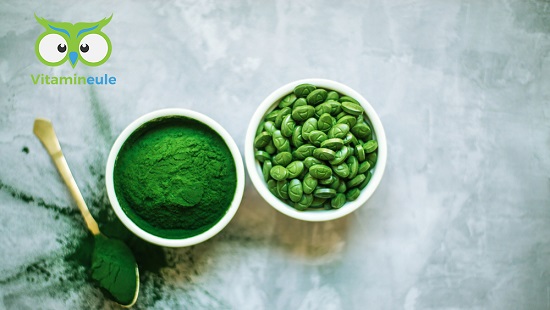

Team Vitamineule
Questions, wishes or suggestions? Simply contact us by e-mail or on Facebook.
1. what is spirulina?
Spirulina is a blue-green microalgae and belongs to the cyanobacteria, colloquially also called blue-green algae. It is called superfood because it is one of the most nutritious concentrated whole foods and is highly valued for its health-promoting properties. Spirulina has even been described by the WHO (World Health Organization) as "the best food of the future". It has been proven that cyanobacteria have existed for 3.5 billion years. Spirulina is therefore one of the oldest forms of life on earth and is partly responsible for the production of oxygen on our planet. Spirulina algae live in alkaline freshwater lakes and springs with pH values between 8 and 10 and require intensive solar radiation for good growth. For this reason it is very rich in nutrients and vital substances. Strictly speaking, Spirulina consists of 60% protein. The spirulina algae is obtained by filtering and centrifuging and then dried. Unlike other micro-algae, spirulina has no cellulose walls, so all the ingredients are more bioavailable.
2 What does spirulina do in the body?
Spirulina contains many valuable ingredients. Spirulina algae strengthen our immune system and protect us from free radicals. Due to its enormously high protein content, the micro algae helps the body to supply protein. Spirulina has a health-promoting effect on increased blood fat values, allergies, liver damage and is used to prevent cancer. The algae is also said to help with a weakened immune system. Blue-green algae lowers blood sugar and can therefore be used to treat diabetes.
3 Why is Spirulina so healthy?
The micro-algae consists of fat and water-soluble nutrients, contains essential antioxidants and thus protects the body against inflammation. Spirulina contains all essential minerals and trace elements. All B vitamins, beta-carotene, vitamin E, calcium, magnesium, iron and copper are contained in the blue-green algae, making Spirulina an absolute all-rounder. If you take Spirulina daily, you can lower your cholesterol level. Spirulina has a high proportion of protein, both vegetarians and vegans find it easier to cover their daily protein requirements. Spirulina even contains significantly more protein than beef, chicken and soybeans. Just one tablespoon of 7 grams of spirulina provides 4 grams of high-quality protein. The algae counteracts ateriosclerosis and reduces the risk of suffering a heart attack. With its mineral content, spirulina ensures that the human organism is protected against acidosis. After ingesting the microalgae, many people feel active and rested, and even feel that tiredness and exhaustion are blown away. That is why spirulina is often used today as a detox or detoxifying agent. The main component of spirulina is called phycocyanabilin. It is this phycocyanabiline that makes the anti-inflammatory and antioxidant properties possible.
4. spirulina and chlorophyll
Spirulina contains the dye chlorophyll. Therefore, the consumption of spirulina can also be taken for cancer prevention or as a concomitant to therapy. Chlorophyll has also been shown to have an anticarcinogenic effect. Chlorophyll blocks special enzyme complexes that would otherwise lead to uncontrollable cell growth. It has been proven that chlorophyll can reduce the number of carcinogenic aflatoxins in the human organism.
5. forms of intake of spirulina
The microalgae is offered dried as a food supplement in the form of tablets, capsules, compacts, powder or flakes. Tablets and capsules are easy to handle and quickly enter into circulation. Swallowing can be a problem for some people. Spirulina powder is a popular alternative for many people. It can be easily added to smoothies or soups and is very quickly utilized by the human organism. However, as the powder has a rather strong taste of algae, most people prefer spirulina capsules.
6. what should be considered when buying dietary supplements?
In general, when buying food supplements containing spirulina, it is important to pay attention to the ingredients. This is because often only a small percentage of the micro algae is present and the rest is filled with artificial additives. These food supplements can often be found in pharmacies or drugstores. We also recommend that you find out exactly whether the preparation comes from Germany in order to ensure high product quality. Spirulina capsules and spirulina tablets should be taken with sufficient liquid. It is also important to note that food supplements should be kept in their original packaging. It is important to store them correctly, as they should be kept at normal room temperature in a dry place. Under no circumstances should dietary supplements be stored in places where it is wet or where a lot of vapours can escape, such as the stove, oven or sink.

Our recommendation:
Vitamineule® Spirulina Capsules
In our online shop you will find our spirulina capsules from Vitamineule®, which are completely free of artificial additives.
The spirulina capsules contain a total of 320 mg of pure spirulina per capsule. Each can contains
150 capsules with neutral taste. In addition to fast & free shipping, we offer a voluntary six-month return guarantee for all products.
7. conclusion
Spirulina is a versatile blue-green microalgae. Colloquially it is called blue-green algae. It is rich in high-quality protein and essential amino acids. Spirulina contains a wide spectrum of all important vitamins. As it is rich in iron and minerals, it supports normal body function and protects us from free radicals. Spirulina strengthens our defences and ensures that every single cell in the human body is supplied with sufficient oxygen and nutrients. Our body is supplied with long-lasting energy, which is why spirulina is also known as superfood. The micro alga can be bought in different variations. It is offered in the form of tablets, capsules, pressed pellets, powder or flakes. We recommend tasteless spirulina capsules for easy intake.
